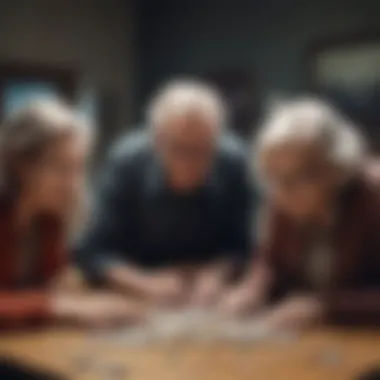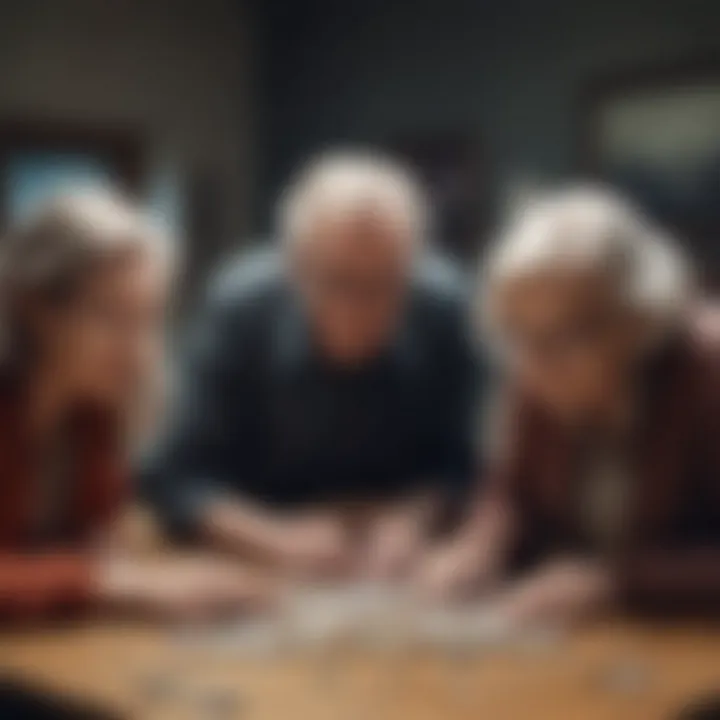Mind Puzzles for Seniors: Boosting Cognitive Health


Understanding Mental Health and Well-being
Mental health has become a focal point in discussions surrounding not just wellness, but overall quality of life. It encompasses emotional, psychological, and social well-being. In simple terms, it’s about how we think, feel, and act. For seniors, maintaining good mental health is indispensable, as it significantly influences daily living, relationships, and even physical health.
What is Mental Health?
Defining mental health goes a long way towards understanding its importance. It involves a spectrum of facets: emotional stability, effective stress coping strategies, how we relate to others and handle life's challenges. When mental health is compromised, it can manifest in varying degrees of anxiety, depression, or other mental health challenges.
The Importance of Prioritizing Mental Well-being
For older adults, taking a proactive stance on mental health is crucial. As life changes — retirement, loss of loved ones, or health issues arise — these transitions can trigger emotional upheaval. Engaging in mind puzzles and similar cognitive activities can play an essential role in sustaining mental agility and resilience.
Common Mental Health Challenges and Disorders
To assess mental well-being among seniors, one should be aware of common conditions they might face, such as:
- Anxiety Disorders: Feeling overwhelmed and worries that can affect daily functionality.
- Depression: A persistent sadness that clouds one's ability to enjoy life.
- Dementia: A serious decline in cognitive function bringing memory loss as a notable sign.
- Social Isolation: Often resulting from numerous factors including mobility issues or bereavement.
Awareness of these challenges not only underscores the urgency to seek help but also raises the necessity of preventive measures like mind puzzles.
Strategies for Improving Mental Health
Self-care Techniques and Practices
In the maze of daily life, self-care should never take a backseat. Implementing practices such as engaging in mind puzzles can significantly elevate mood and cognitive function. Daily activities can either be simple like reading or more intricate like playing strategy games or puzzles. It’s all about finding what resonates with you.
Building Resilience and Stress Management
Resilience is a vital skill that can be nurtured through consistent practice. Stress management techniques, including mindfulness, breathing exercises, and cuddling up with a challenging puzzle, can pave the way towards greater emotional stability and control of one’s own mental wellness.
Seeking Professional Help: Therapy and Counseling
Sometimes, a little support goes a long way. Seeking advice from therapists or counselors can offer tailored strategies and coping mechanisms. They can guide on what puzzles or activities can suit one’s specific needs, often using cognitive behavioral techniques to enhance mental resilience.
Finding Balance in Life
Healthy Lifestyle Choices: Diet, Exercise, and Sleep
A careful approach to diet plays an important role in mental well-being. Foods rich in Omega-3 fatty acids, antioxidants, and amino acids contribute to better brain health. Likewise, regular physical exercise, even if it’s just a brisk walk, and adequate sleep are crucial in finding balance in life. Engaging in puzzles can also help stimulate both mind and body.
Mindfulness and Meditation Practices
Mindfulness has made its mark, and for good reason. Practicing mindfulness meditation can improve emotional well-being and focus. For seniors, engaging in mind puzzles while being mindful of their thoughts creates a harmonious blend of mental activity and emotional awareness.
Setting Boundaries and Managing Time Effectively
By understanding personal limits, seniors can ensure that they’re not overwhelmed. Allocating specific times for puzzles, rest, and social activities can help maintain a balanced mindset throughout the day.
Enhancing Personal Development
Goal Setting and Productivity Tips
Setting goals, whether big or small, adds purpose to the day. Start simple: finish a puzzle, read a book, or engage with a friend. Achieving these mini-goals creates a sense of accomplishment that can build enthusiasm.
Building Healthy Relationships and Social Connections
Maintaining connections with loved ones is essential. Activities like group puzzle-solving make it a social event, enriching relationships by combining cognitive engagement with social interactions.
Practicing Gratitude and Positivity
No matter how small, gratitude can shift focus from negative thoughts. Keeping a gratitude journal or simply reflecting on positive experiences can uplift one’s mood. Positivity acts as a mental shield, protecting against the gloominess that can come during tough times.
Tips for Maintaining Mental Well-being
Strategies for Preventing Burnout
Burnout can sneak up, especially when routines fall into a rut. To combat it, mixing in new puzzles and games or simply stepping outside can rejuvenate the mind.
Coping with Challenges and Setbacks
Life coming at you fast? Acknowledge it. Recognizing setbacks as part of life helps maintain a balanced perspective. Puzzles can be a fantastic way to refocus the mind, drawing attention away from stressors.
Creating a Supportive Environment
Ultimately, a supportive environment is essential. Whether that be decluttering one’s space, surrounding oneself with positive influences, or setting up a dedicated puzzle corner, these actions promote a healthy mindset.
In this journey of enhancing cognitive abilities through mind puzzles, understanding the interplay between mental health and cognitive engagement is key. Staying flexible and open to various forms of mental exercises allows seniors to navigate this landscape with confidence.
The Importance of Mental Stimulation for Seniors


Engaging the mind is like sharpening a knife; if you don’t use it, it gets dull. Mental stimulation for seniors plays a crucial role, not only in cognitive health but also in emotional stability. As we age, the brain undergoes subtle changes that can affect memory, processing speed, and overall mental agility. By actively engaging with puzzles and other cognitive activities, seniors can combat these changes, which might otherwise lead to cognitive decline.
Understanding Cognitive Decline
Cognitive decline refers to the gradual loss of cognitive functions, such as memory, attention, and the ability to think clearly. This phenomenon can vary significantly from person to person, often influenced by a mix of genetics, lifestyle, and environmental factors. Research shows that mild cognitive impairment can progress to more serious conditions, such as Alzheimer’s disease. The basic rule of thumb is that the brain, much like the body, needs regular exercise to remain fit. Engaging in mentally stimulating activities allows seniors to exercise their minds, essentially providing a counterbalance to decline.
A common observation is that mentally active seniors often manage to maintain sharper cognitive abilities longer than their less engaged peers. According to some experts, activities that challenge the mind—like learning new skills or solving puzzles—can promote neuroplasticity, enhancing connections between brain cells even in later years.
Benefits of Staying Mentally Active
The advantages of keeping one’s mind active during retirement years reach far beyond mere enjoyment. Here are some notable benefits:
- Enhanced Memory: Regular engagement in puzzles and challenging mental tasks can help improve memory retention, allowing seniors to recall names, faces, and daily tasks more effectively.
- Improved Problem-Solving Skills: Puzzles often require creative thinking and problem-solving. Regular practice enhances one's ability to reason through challenges, which can be invaluable in real-life situations.
- Greater Emotional Wellness: Mental activities often reduce feelings of isolation and depression. Connecting through shared puzzles, be it with family or in community groups, can cultivate a sense of belonging.
Additionally, mental stimulation can improve mood, giving seniors a sense of accomplishment. The act of completing a challenging crossword or finishing a jigsaw puzzle can boost self-esteem, as simple as it may seem.
"To keep your brain healthy, you must use it, just like a muscle. Engage it with puzzles and watch it grow stronger!"
In essence, recognizing the importance of mental stimulation is a significant stepping stone towards enhancing cognitive and emotional health for seniors. By emphasizing the engagement of the mind, we create pathways to a fuller, more satisfying life well into old age.
What Are Mind Puzzles?
In the landscape of cognitive enhancement, mind puzzles stand out as engaging tools. They become a bridge that connects senior citizens with their mental faculties. Addressing a variety of challenges, these puzzles serve both recreational and therapeutic purposes, making them vital for maintaining mental agility. By systematically working through mind puzzles, older adults can bolster their focus, memory, and even mood.
Defining Mind Puzzles
Mind puzzles encompass a wide array of intellectually stimulating activities designed to challenge and enhance cognitive abilities. These activities can take various forms, ranging from word games to strategic thinking puzzles, all aimed at engaging the brain. At their core, mind puzzles are not just about solving problems; they stimulate thought processes, encourage critical thinking, and bring joy to the participants.
The allure of mind puzzles lies in their accessibility. Whether one is a novice or a seasoned puzzle solver, there exists a puzzle suitable for every skill level. This adaptability is significant because it allows seniors to engage with puzzles that match their comfort zones while still pushing their mental boundaries. As such, these puzzles become not just tools for entertainment but instruments for personal growth.
Types of Mind Puzzles
The variety within the realm of mind puzzles is extensive, catering to different tastes and preferences. Several types of puzzles have gained popularity, each with its unique attributes and benefits.
Crossword Puzzles
Crossword puzzles are a beloved staple in the world of mind challenges. They require solvers to fill in a grid based on provided clues, tapping into vocabulary and general knowledge. One of their key characteristics is the blend of fun and learning; as individuals search for the right words, they often encounter new vocabulary that enriches their language skills.
Advantages: Aside from improving knowledge, crossword puzzles challenge the brain to think laterally and recall information. Moreover, their widespread availability—from newspapers to dedicated apps—means they are clutter-free of barriers, making them a popular choice among seniors.
Disadvantages: However, not every senior may find crosswords equally enjoyable. For some, the clues can be frustratingly obscure, leading to a sense of defeat rather than accomplishment. This potential for frustration necessitates careful selection based on individual preference and ability levels.
Sudoku
Sudoku puzzles have gained traction for their straightforward yet challenging nature. Using a grid system, the objective is to fill in numbers without repetition across rows, columns, and sections. The allure of Sudoku lies in its focus on logic rather than language, allowing participants to engage their analytical thinking skills.
Advantages: Sudoku fosters improved focus and enhances problem-solving capabilities, ideal for anyone looking to sharpen their mind. The puzzles also come in varying difficulty levels, allowing individuals to progressively advance their skills while enjoying a sense of achievement.
Disadvantages: On the flip side, those who are less comfortable with numbers might find Sudoku daunting. The rules can be intimidating, leading to disengagement rather than enjoyment if they are not framed correctly.
Logic Games
Logic games encompass a range of activities that demand creative problem-solving. Whether it's riddles, sequence puzzles, or pattern recognition games, these activities provide a rich tapestry of challenges. Participants need to apply deductive reasoning and lateral thinking—key cognitive skills that sharpen one's mental acuity.
Advantages: Logic games are versatile, as they often require no special equipment and can be easily played alone or in groups. Such flexibility promotes social interaction and collaboration when done with peers or family, culminating in a shared bonding experience.
Disadvantages: However, the abstract nature of logic puzzles can sometimes confuse participants. If a game becomes too complex, it might lead to frustration, underscoring the importance of selecting puzzles that align with individual cognitive strengths.
Jigsaw Puzzles
Jigsaw puzzles provide a tactile and visually engaging way to exercise the brain. The process of fitting pieces together while conceptualizing the final image caters to both cognitive and fine motor skills. Their charm lies not only in the challenge but also in the satisfaction of seeing a complete picture emerge from a chaotic assortment of pieces.
Advantages: Jigsaw puzzles can be particularly beneficial for improving spatial reasoning and visual perception. They also encourage patience and perseverance, qualities that are often invaluable in daily life.
Disadvantages: On the downside, some individuals may find that the time-consuming nature of jigsaw puzzles doesn't fit seamlessly into their schedules. Furthermore, if someone struggles with wheel coordination, they may feel overwhelmed by the physical aspect of assembling the pieces.
From crosswords to jigsaws, each mind puzzle offers its set of challenges and rewards. As seniors engage with these activities, they can cultivate a rich tapestry of cognitive and social benefits, leading to improved overall well-being. By choosing the right mix of puzzles, caregivers and seniors alike can foster an environment that promotes mental engagement and joy.
Cognitive Benefits of Mind Puzzles
Diving into the realm of mind puzzles reveals a treasure trove of cognitive advantages, particularly for seniors. As the brain ages, it's crucial to foster its capabilities and maintain mental sharpness. Engaging in puzzles serves as more than just a leisurely pastime; it harbors profound benefits that can significantly enhance cognitive functions. Each puzzle type offers its unique set of challenges that, when tackled, can contribute to overall mental well-being.
Enhancing Memory Retention
Memory plays a vital role in our daily lives, and as we age, retaining information can feel like trying to hold onto soap with wet hands. Mind puzzles provide a fun yet challenging avenue to strengthen memory retention. For instance, crossword puzzles require individuals to recall words and meanings from various categories, pushing against the walls of memory and fostering connections.
A study highlighted that people who regularly engaged in such activities performed better in memory tests than those who didn’t. The act of recalling information while solving a puzzle cultivates mental pathways, reinforcing what we learn and remember. This consistent exercise can slow down memory decline, allowing seniors to retain their memories longer and enhancing their overall quality of life.
Improving Problem-Solving Skills
Life is, without a doubt, often a series of problems to solve. Mind puzzles are an entertaining training ground for honing these problem-solving skills. Whether it’s wrestling with Sudoku grids or figuring out the best way to fit pieces in a jigsaw puzzle, these activities encourage critical thinking and light up the cerebral pathways responsible for logical reasoning.


Let’s take Sudoku as an example. It’s not just about filling numbers in a box; it’s about recognizing patterns, analyzing what fits where, and thinking ahead. The more a senior engages in these puzzles, the sharper their problem-solving abilities become. This enhancement is not limited to puzzles; these skills translate into everyday life, where seniors can approach their daily challenges with newfound confidence and agility.
Boosting Analytical Thinking
Analytical thinking is like a muscle; the more you work it, the stronger it gets. Mind puzzles offer the perfect weights to lift. As seniors peruse puzzles demanding strategic filtering of information, they learn to dissect complex scenarios and develop well-rounded decisions based on their findings.
Logic games, for instance, entice seniors to explore various outcomes based on given clues. As they solve these puzzles, they learn the value of observation, pattern recognition, and hypothesis testing, thus enhancing their capacity to analyze and interpret diverse situations. Over time, this can lead to more adept reasoning skills not just in puzzles but also in day-to-day situations.
"Engaging in mind puzzles empowers seniors to stimulate their minds and unlock latent cognitive capabilities, proving that age is but a number when it comes to mental fitness."
Incorporating Mind Puzzles into Daily Life
Engaging in mind puzzles offers seniors an effective path to maintaining mental acuity and fostering emotional well-being. As we dive into the realm of daily mental exercises, it becomes increasingly crucial to understand how to seamlessly integrate these activities into a bustling life, even amidst the myriad responsibilities seniors often juggle.
Creating a Daily Puzzle Routine
Establishing a daily puzzle routine not only ensures consistent cognitive engagement but can also serve as a form of self-care. When creating such a routine, it is essential to consider both the time of day and personal preferences. Some individuals might find mornings a more conducive time for brain games, when their minds are still fresh and alert. Others may prefer winding down in the evening with a stimulating puzzle to relax before bed.
In crafting this routine, a few strategies can be beneficial:
- Start Small: Select a few puzzles per week and gradually increase them to prevent overwhelm.
- Set Timers: Allocating a specific amount of time can help structure the session, making it both productive and enjoyable.
- Location Matters: Choose a comfortable spot for solving puzzles, whether it's a cozy corner of the living room or a sunlit spot in the garden.
Group Puzzle Activities
Social interaction is a vital ingredient for enhancing mental well-being, especially for seniors. Group puzzle activities serve as a dual benefit: they not only stimulate the mind but also forge connections among participants. Local community centers, retirement homes, or family gatherings can be the perfect backdrops for these enriching experiences.
Consider the following when planning group activities:
- Choose Varied Puzzles: From crossword puzzles to logic games, providing a mix caters to diverse interests and skills.
- Create Teams: Divide participants into small groups to foster teamwork as they solve puzzles together.
- Celebrate Success: Acknowledge achievements, whether big or small. It feels good to celebrate progress and fosters a supportive atmosphere.
Digital vs. Paper Puzzles
In an age rapidly leaning towards technology, one might wonder which format better serves our cognitive purpose—digital or paper. Each avenue brings its advantages, and the choice largely hinges on personal comfort and accessibility.
Digital Puzzles:
- Offer a vast selection at one's fingertips, from apps to online platforms.
- Can be adjusted for difficulty, allowing customization according to one’s cognitive state that day.
- Often include interactive elements that can enhance the engagement.
Paper Puzzles:
- Provide a tangible experience, which can be mentally rewarding in its own right.
- Allow for a break from screens, reducing eye strain and digital fatigue.
- Encourage shared experiences; friends and family can engage together over a coffee table puzzle.
Ultimately, the choice is highly personal. It is about finding what works best for you or your loved one, creating meaningful engagements that keep the mind sharp.
The beauty of mind puzzles is not just in solving them, but in the journey they take you on—cultivating skills, enhancing relationships, and nurturing well-being.
Incorporating mind puzzles into daily life opens a doorway into cognitive reinvigoration, promoting a sense of purpose and connection among seniors.
Challenges in Engaging with Mind Puzzles
Engaging with mind puzzles can sometimes feel like navigating a maze without a map. For seniors, the journey through these cognitive exercises comes with its unique set of challenges. Understanding these hurdles is not just about recognizing difficulties; it’s also about finding solutions that can enhance the experience and make the process enjoyable and beneficial.
Adapting to Different Skill Levels
One of the primary challenges is the varying skill levels among seniors. Just like a well-made shoe, a puzzle needs to fit just right. Too easy, and it becomes dull; too tough, and it can lead to frustration.
- Personalized Puzzles: It’s essential for caregivers and seniors to choose puzzles that match individual capabilities. For instance, some might find Sudoku tantalizingly engaging, while others may prefer the tactile satisfaction of jigsaw puzzles.
- Gradual Progression: Advancing from simpler puzzles to more complex ones can maintain interest and build confidence. Working on a few easier crosswords before diving into the more intricate ones can be a game-changer.
- Classes and Groups: Joining puzzle-solving groups or classes may also help seniors refine their skills. These settings create a natural opportunity for learning from peers, which can often make complex concepts more digestible.
Taking the right approach can transform mundane puzzles into valuable cognitive exercises that are both challenging and rewarding, encouraging seniors to thrive.
Overcoming Frustration and Stress
The flip side of puzzles is that without proper management, they can cause stress rather than alleviate it. If puzzles start to feel like a chore, disengagement can quickly set in.
- Positive Mindset: Encouraging a positive mindset is key. Remind seniors that puzzles are meant to be fun, not a source of anxiety. A reminder that everyone struggles at times might provide reassurance.
- Time Limits: Implementing flexible time limits can be helpful. Rather than rushing through, allowing seniors to pace themselves can reduce pressure. Maybe setting a timer for 20 minutes helps prevent the ‘stress clock’ from ticking too loudly.
- Taking Breaks: It’s essential for seniors to realize that it’s okay to step away. When the going gets tough, taking a short break can refresh the mind, making solutions clearer when they return to the puzzle.
"Puzzles are like fine wine; they should be savored, not rushed."
Moreover, framing each challenge as a part of the journey can make the process of engaging with puzzles much more fulfilling. By integrating relaxation techniques and emphasizing enjoyment, caregivers can assist seniors in maintaining their enthusiasm for mind puzzles.
The bottom line is that while engaging with mind puzzles presents challenges, understanding these challenges allows caregivers and seniors to tailor the experience to better suit their needs. In doing so, not only do they uplift mental acuity, but they also foster a sense of accomplishment and joy.
Resources for Mind Puzzles
When it comes to enhancing cognitive abilities, seniors need access to a variety of mind puzzles. This section explores assorted resources that help facilitate engagement with puzzles, ultimately promoting mental health and well-being. By incorporating different forms of puzzles into their routines, seniors can enjoy cognitive stimulation while having fun—an important factor that should not be overlooked.
Books and Magazines
Books and magazines specifically tailored for puzzles present a tangible and classic option for seniors. Whether having a cup of tea in the morning or winding down in the evening, flipping through pages loaded with mind challenges has an undeniable charm. Often, these printed materials not only offer puzzles but also provide valuable tips on enhancing problem-solving skills, which can be beneficial for those looking to sharpen their cognitive abilities.


- Accessibility: Many of these books and magazines can be found in public libraries or at local bookstores, making them easy to access.
- Variety: From crossword puzzles in The New York Times to Sudoku challenges found in dedicated magazines, the options are endless. This variety helps maintain interest and engagement.
- Activities with Others: These printed resources can be enjoyed alone or with family, fostering connection over shared challenges.
For those who prefer a structured approach, consider puzzle books created specifically for seniors. These often have larger print and themes tailored to their interests, making it easier to dive in without straining their eyes or losing interest too quickly.
"Engaging with physical puzzle books not only keeps the mind active but also provides a calming routine that is deeply satisfying."
Online Puzzle Websites
The digital realm has a plethora of online puzzle websites that cater to seniors, designed to bring cognitive challenges right to the fingertips. The convenience of accessing these puzzles anytime and anywhere can prove to be essential for many.
- User-Friendly Interfaces: Sites like BrainBashers or Puzzle Choice offer a broad selection of games that are easy to navigate.
- Customization Options: Online platforms often have features that allow players to choose difficulty levels, so seniors can gradually increase the challenge as they improve. This adaptability caters to different skill levels without overwhelming the user.
- Interactive Features: Playing puzzles online may also include leaderboards or the option to play against friends or family members. This social aspect can make the experience more engaging.
Exploring these resources—whether flipping through pages of a favorite magazine or delving into the vast ocean of online puzzles—offers seniors numerous pathways to keep their minds sharp.
By ensuring diverse engagement with mind puzzles, both the resources and activities transform this cognitive pursuit into an enjoyable and rewarding aspect of daily life.
Mind Puzzles and Social Interaction
Engaging in mind puzzles is not just an individual endeavor; it holds substantial potential for fostering social connections among seniors. With age, many individuals may find their social circles dwindling due to various factors, such as mobility issues or the loss of close friends and family. This decline can lead to feelings of isolation and loneliness, which can negatively impact mental health. Mind puzzles, when approached as a group activity, can serve as a lighthouse in these foggy waters, illuminating paths for socialization while sharpening cognitive abilities.
Building Connections through Group Puzzles
Group puzzles turn what might otherwise be a solitary activity into a vibrant collective experience. When seniors gather, be it at a community center or in a cozy living room, the act of tackling a puzzle together can lead to lively banter and shared laughter, solidifying bonds that bring joy and camaraderie.
As individuals wrestle with a crossword or piece together a jigsaw, they're not merely solving problems but also engaging in conversations about strategies, memories, and life experiences. This exchange cultivates community and rekindles social skills that might have lain dormant. Not only do they promote cooperative behavior, but these activities also engender a sense of achievement when completed collectively. The smiles and satisfaction on shared accomplishments can greatly enhance emotional well-being.
Moreover, when seniors work on mind puzzles together, they are often exposed to different thought processes and perspectives. Sharing techniques for solving puzzles can lead to learning new cognitive strategies, which enriches the mental experience beyond the task at hand. It’s these moments of connection that create warm and fuzzy feelings that combat the cold sting of solitude.
Encouraging Family Engagement
Involving family members in mind puzzles transforms these activities into a wonderful opportunity for familial bonding. When grandchildren sit down with their grandparents, they not only get to share stories but also indulge in puzzles that bridge generational gaps. Through shared puzzles, seniors can pass down knowledge while engaging with their younger relatives in a casual yet stimulating environment.
Families can dedicate specific times for puzzle-solving, turning it into a sacred tradition. Be it a weekend puzzle night or spontaneous challenges during a family gathering, these moments foster connection and communication. The laughter that erupts over a tricky Sudoku or the playful disputes about where a puzzle piece truly belongs are golden opportunities for relationship-building.
Furthermore, the participation of family can help seniors challenge themselves and engage with complex puzzles they might hesitate to take on alone. This shared experience not only boosts their confidence but also creates lasting memories that everyone will cherish.
"Puzzles are more than just pieces of paper or cardboard. They are the threads that weave families and friends closer together."
Ultimately, incorporating puzzles into family time not only enhances cognitive abilities but also paves the way to strengthen family ties and create a nurturing environment where memories and laughter thrive.
Practical Tips for Caregivers
When it comes to enhancing the cognitive abilities of seniors through mind puzzles, caregivers play a pivotal role in creating an enriching environment. Understanding how to best support and engage older adults can make a world of difference in their mental and emotional well-being. Practical tips can streamline this process, allowing caregivers to provide tailored experiences that motivate seniors while also maximizing the cognitive benefits of puzzles.
Selecting Appropriate Puzzles
Finding the right puzzles is not a one-size-fits-all situation. Seniors have varied interests, skill levels, and cognitive abilities. Therefore, before selecting puzzles, it is vital to consider the personal preferences and cognitive capabilities of each individual. For instance, some might enjoy word puzzles like crosswords, while others may find joy in number games like sudoku. Choosing puzzles that can be challenging yet enjoyable can help sustain interest and foster a sense of achievement.
- Assess Interests: Engage with the seniors to understand what types of puzzles resonate with them. Knowing their interests can guide your selections effectively.
- Skill Levels Matter: Not every puzzle needs to be a Herculean task. The goal is to find that sweet spot where the puzzle is neither too easy nor too hard. This balance can stoke engagement rather than frustration.
- Physical Accessibility: When selecting puzzles, consider their form. Digital puzzles may offer ease of use for some due to adjustable sizes or hints. Physically handling puzzle pieces, like those in jigsaw puzzles, might spark nostalgia for others, making it a suitable choice.
Facilitating Puzzle Engagement
Engaging seniors with puzzles can be a rewarding endeavor, but it’s not always straightforward. Facilitation involves not just handing over a puzzle but also encouraging active participation and interaction. Here are key strategies for doing so effectively.
Offering Support and Encouragement
Support in this context isn't just about being there, but actively fostering a positive environment. Encouragement can aid in boosting confidence levels and instilling a sense of accomplishment. When seniors know that someone believes in their ability to solve a puzzle, it can be a game changer.
- Regular Check-ins: This can be as simple as asking how they feel about the challenges. Positive feedback can reinforce their efforts and motivate them to tackle more.
- Celebrate Achievements: Each completed puzzle, no matter its size, should be celebrated. This boosts self-esteem and shows that effort is valued. A casual shout-out for completing a tricky sudoku can go a long way.
"Sometimes, it’s the simple pat on the back that makes the biggest difference. Support should not be underestimated."
Monitoring Progress and Challenges
Keeping tabs on how seniors engage with mind puzzles is also crucial. This doesn’t just mean tracking what kinds of puzzles they enjoy but also noting where they face obstacles. Recognizing these hurdles can inform better choices and adjustments moving forward.
- Regular Reviews: Take a moment to discuss which puzzles were enjoyable and which were less so. This can provide valuable insights into their preferences.
- Adjusting Difficulty: If a particular puzzle seems too challenging, switching to a less difficult option can reignite interest. A bit of trial and error is a normal part of the process.
- Document Changes: Consider keeping a simple note of what works or doesn’t work. This record helps in making informed selections in future puzzle engagements.
In summary, when caregivers invest time in selecting suitable puzzles and facilitating engagement, the overall experience for seniors can significantly improve. These practical tips illustrate the vital role that caregivers can play in this journey for enhanced cognitive health and social connections.
Future Trends in Mind Puzzles for Seniors
Navigating the landscape of mind puzzles for seniors is not just a matter of revisiting the classics; it is about evolving alongside the rapid strides we see in technology and cognitive science. As seniors increasingly turn to mind puzzles to stave off cognitive decline and enhance their everyday experiences, it's essential to keep an eye on future trends that promise to redefine how these puzzles are experienced.
The Role of Technology
In today’s digital age, technology is reshaping every aspect of our lives, including leisure activities. For seniors, engaging with mind puzzles is becoming more accessible as apps and online platforms are tailored specifically for them.
- User-Friendly Interfaces: Developers are focussing on creating interfaces that are not only intuitively designed but also cater to the varying skill levels of older adults. This means larger text, simplified navigation, and a smooth user experience are becoming standard features.
- Online Communities: Another important element is the emergence of online platforms where seniors can connect over puzzles. These platforms allow them to share thoughts, strategies, and even progress with peers, fostering a sense of community. Imagine being able to discuss a tricky Sudoku puzzle with someone across the globe – the potential for social interaction is immense.
- Adaptive Learning Algorithms: Some applications are incorporating algorithms that adapt puzzle difficulty based on users’ performance. This bespoke approach keeps the experience challenging yet achievable, motivating seniors to persevere without feeling overwhelmed.
- Integration of AR/VR: Emerging technologies like augmented and virtual reality are stepping into the realm of mind puzzles. Picture jigsaw puzzles where pieces can be placed in a 3D environment or solving logic games within a virtual setting that simulates real-life scenarios. Such experiences engage not just the mind but the senses, heightening the overall puzzle-solving experience.
Innovative Puzzle Formats
While traditional puzzles have their merit, there’s much to be said for innovative formats that stimulate cognitive faculties in fresh ways. This variety is crucial for keeping engagement high and interest piqued among seniors.
- Audio Puzzles: Utilizing auditory cues and prompts, audio puzzles are designed for those who may have vision impairments. Rather than relying solely on visual elements, these puzzles harness sound, making the experience multi-sensory.
- Interactive Apps: The rise of interactive puzzle apps encourages seniors to engage in challenges that require movement or physical interaction, such as puzzles that activate a device or require input through gestures. This not only works cognitive function but can also be beneficial for physical health.
- Theme-Based Puzzles: Customized puzzles that cater to personal interests or nostalgic themes can tap into seniors’ memories. Think of puzzles based on famous art, historical events, or even personal photographs, integrating a layer of emotional investment that enhances participation.
In summary, the future of mind puzzles for seniors is bright and teeming with possibilities. As we blend technology and innovative formats, the engagement levels will likely soar, ensuring that seniors not only receive mental stimulation but also a rich, fulfilling experience that addresses their holistic well-being.















